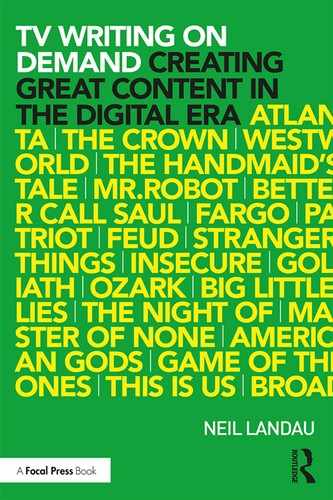Contents
Peak TV vs. Pique TV: The Streaming Smorgasbord
How to Navigate TV Writing On Demand
Part I Satisfying the Binge Viewer: New Genres, Formats and Trends
1 Blurring the Lines: Redefining Genre and Tone in the Dramedy
Dramedies and Life on the Cringe
You‘re the Worst: The Anti-Romantic Dramedy
Satire as the Weapon of Reason in Dear White People
I Love Dick: Exploring the “Female Gaze”
Master of the Observational: Master of None
Better Things: Philosophical Vignettes
The Mystery Underlying the Crime: The Night Of
The Good Fight: The Procedural Within a Procedural
Search Party: Something From Nothing
3 Trust Me: The Long Con On-Demand—From The Riches to Sneaky Pete, Patriot, The Americans and More
The Period Political Masquerade: The Americans
Entrapment and Reversals: The Night Manager
All Is Not What It Seems: The Good Place
Ozark: Who Can a Con Artist Trust?
![]() Bonus Content: The Path, Younger, Mr. Robot
Bonus Content: The Path, Younger, Mr. Robot
4 Dystopias, Multiverses and Magic Realism
The Constructive/Destructive Power of Ideas: The Handmaid’s Tale
Our World with a Cautionary Twist
Crafting the Supernatural/Dystopian Pilot
Microcosmic Dystopias and the Monster Mash: American Gods
Portals and Multiverses: Childlike Wonder in Stranger Things
Surprise and Shifting POV: The OA
Adjoining Realms in The Man in the High Castle
5 Story Tentacles: Making Surprising Choices That Yield More Story
Keep Your Frenemies Close: Orange Is the New Black
You Can’t Always Get What You Want … Mozart in the Jungle
A Window Onto a New World: Switched at Birth
Taboo Relationships in Comedies
When a Flaw Becomes an Asset: Girls
The Macro/Micro Approach: The Young Pope
Game of Thrones: The Ultimate Story Tentacle Show?
![]() Bonus Content: Breaking Bad, Scandal, Mad Men, Taxi, plus the Switched at Birth pilot teaser
Bonus Content: Breaking Bad, Scandal, Mad Men, Taxi, plus the Switched at Birth pilot teaser
6 Spotlight on a Rebel: Ryan Murphy Reinvents the Mini-Series by Embracing His Inner Outsider
Why Can’t I Be Audrey Hepburn?
Tone is everything in television
The More Specific You Make Something, The More Universal It Becomes
“No” = A Rest Stop on the Road to “Yes”
Limitation as an Opportunity and Differentiator
Part II Developing Iconic Characters: Relatability and Authenticity
7 Character Empathy vs. Sympathy: How and Why We Align With Characters’ Wants and Needs
Judgment, Morality and Perception
The Insatiable Appetite of the Ego
Big Little Lies, Guilt and Shame
Sympathy for the Robot: Westworld
Hannah, Clay and the Razor’s Edge: 13 Reasons Why
8 Choosing Between Two Wrongs: Characters Trapped by Limitation
Homeland: The Lasting Effects of Devastating Decisions
Politics, Power and Internal Logic: Legion, The Handmaid’s Tale
Jessica Jones: How Late is Too Late?
Guilt, Maturity and Aspirations: This Is Us
The Cleanse and Crossing the Line
![]() Bonus Content: Bates Motel, Breaking Bad, Queen Sugar, Orange Is the New Black
Bonus Content: Bates Motel, Breaking Bad, Queen Sugar, Orange Is the New Black
9 The Wild Card Character: Power Dynamics and Motivations
The Wild Card With a Twist: Mr. Robot
The Wild Card’s Wild Card: Mozart in the Jungle
The Roommate Soulmate: Unbreakable Kimmy Schmidt
The Pushy Roommate/Friend/Business Partner/Mentor: Silicon Valley
Disrupting an Institution: The Young Pope
The Role of Destabilizing Characters: Better Call Saul, The Crown and Goliath
10 Writing Smart Dialogue in the Digital Era
![]() Bonus Content: The Profound Power of Silence plus Better Call Saul excerpt
Bonus Content: The Profound Power of Silence plus Better Call Saul excerpt
Idiosyncratic Voices: Empire, Silicon Valley
Verbal and Non-Verbal Communication
Point of View and Subtext: The Last Man on Earth, Crazy Ex-Girlfriend
Naturalistic Dialogue: Profanity in The Wire
Backstory: What They Don’t Say
Overlapping Dialogue: Stranger Things
![]() Bonus Content: Bones, Orphan Black, The Americans, Scandal
Bonus Content: Bones, Orphan Black, The Americans, Scandal
Part III Career Strategies in the Evolving TV Marketplace
Intellectual Property Glossary
Breaking (Through the Noise) and Entering (the Zeitgeist)
Adapting Autobiographical Material
![]() Bonus Content: A deeper dive into putting a new spin on forms of I.P., from comics to musicals
Bonus Content: A deeper dive into putting a new spin on forms of I.P., from comics to musicals
12 The Show Bible as an Essential Sales Tool
If There’s a Central Mystery, There Needs to Be a Series Bible
Networks That Circumvent the Pilot Process (Tend to) Commission Series Bibles
The Following Networks Still Make Pilots, But Do They Require Series Bibles?
Half-Hour Sitcoms Rarely, If Ever, Require a Series Bible …
Drafting the Series Mini-Bible
13 Trips, Traps, Tropes: Avoiding Rookie Mistakes
“Great Pilot, But What’s the Series?”
“There’s No Sense of Place or Time”
“The Dialogue/Style/Tone Are Uninspired”
“The Stakes Are Not High Enough”
“There Are Too Many Characters”
“The Good Stuff Appears Too Late”
Know the Industry—Yet Be Innovative
![]() Bonus Content: “The War Against the Kitchen Sink Pilot,” a/k/a “The Premise Pilot Blues”
Bonus Content: “The War Against the Kitchen Sink Pilot,” a/k/a “The Premise Pilot Blues”
14 The Creative Entrepreneur: From Kickstarting a Web Series to Hitting the Big Time
Advice From the (Staff Writer) Trenches
![]() Bonus Content: List of the Top Contests and Fellowships
Bonus Content: List of the Top Contests and Fellowships
More Opportunities Than Ever—Yet It’s Never Been More Competitive
Show Them Your Proof of Concept
What I Really Want To Do Is Direct (a Web Series)
